The End of an Era
Eulogy to Herbert Steffen
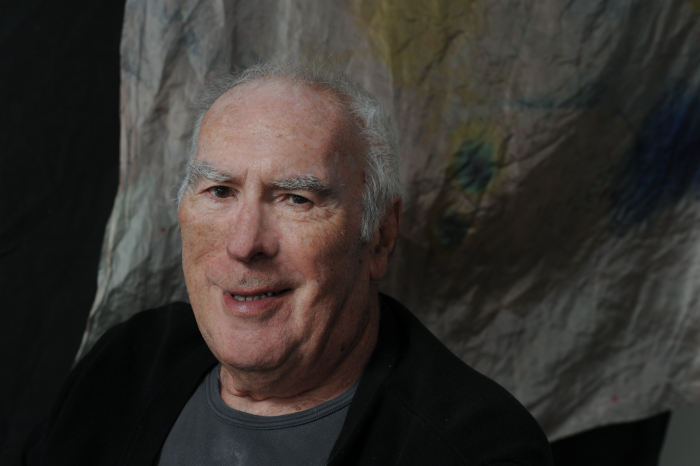
herbert_steffen_2022_10_22_ef.png
Herbert Steffen (10/18/1934 - 11/18/2022), photographed by Evelin Frerk on 10/22/2022
Herbert Steffen is dead. The founder of the Giordano Bruno Foundation, who strengthened the secular forces in Germany like few others, died last Friday at the age of 88. His friend and companion Michael Schmidt-Salomon commemorates a remarkable person.
***
There are events that you know will happen in the foreseeable future, for which you have already prepared yourself internally in order to be as well prepared as possible if the worst comes to the worst, but which then leave you completely taken aback when they actually happen. This is how I feel about the death of my friend Herbert Steffen, with whom I have shared many experiences over the past 19 years and talked almost daily. At the moment, it is simply inconceivable to me that this is supposed to forever be a thing of the past.
Herbie, as I called him, came into my life like a force of nature in November 2003. He himself aptly described our first meeting in his autobiography, "My Long Road from Paul to Saul". In fact, I had no expectations whatsoever when he visited me back then together with the author Carsten Frerk. When Herbert said goodbye to me with the words "I think today was the beginning of a long and fruitful friendship and collaboration!", I thought it was nice, but also a bit strange. I did not know how to feel about it, since I did not yet know "my Herbie" at that time! It only became clear to me later that he didn't casually say such things, but always followed through on his words.
A doer – not an eschewer
Herbert was, as he said himself, "a doer - not an eschewer": When he had set his sights on a goal, he immediately went to great lengths to realize it. And once he recognized that he could or had to rely 100 percent on one person to achieve such a goal, he never let go. A decade before me, the great church critic and writer Karlheinz Deschner had witnessed this. I am sure that at the beginning of the 1990s Karlheinz had not even begun to suspect that the encounter with this man, who suddenly appeared at his house because he had read "Abermals krähte der Hahn" while on vacation, would change his life from the ground up. Karlheinz reacted just as skeptically to Herbert's spontaneous statement, "I'm your patron from today on!" at the time as I did a decade later to Herbert's parting words. But we were both wrong about him: Herbert stood firmly by what he promised. And before you knew it, you were swept away by the force of his energy.
Herbie supported Karlheinz Deschner like no one else, but: He also challenged him like no one else! Since Herbert had set himself the goal of completing the "Criminal History of Christianity", he could not accept that Karlheinz, who occasionally wanted to write something else than "the damned crime series", deviated from the master plan from Mastershausen (Herbert's former residence in the Hunsrück area). Woe betide, therefore, if a chapter of the crime story did not meet the agreed deadline! Herbie, who really did everything to support Karlheinz in his work as well as in private matters, expected corresponding results for his commitment and reacted, as lovable as he could be as a human being, exceedingly displeased when promises were not kept. Fortunately, Bibi (Herbert's second wife Ingrid Steffen-Binot), with whom Karlheinz had developed a particularly warm relationship, always managed to smooth the waters. Otherwise, this special male friendship would probably have collapsed early on and the "Criminal History of Christianity" would never have been completed.
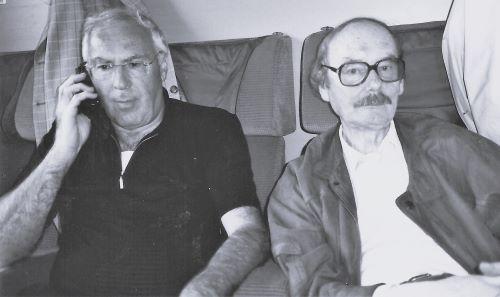
With the drive of a thirty-year-old
Karlheinz was deeply grateful to Herbert for his support, but the sensitive writer from Franconia could hardly manage his sometimes somewhat gruff "Hunsrücker nature". Like Bibi, I also tried again and again to mediate between the two friends, which sometimes fared better and sometimes worse. Personally, however, I had no problems with Herbert's penchant for unfettered honesty. Since some of my relatives come from the same region, I knew that Hunsrückers (compared to people from other regions) are often very warm-hearted, but also unabashedly honest, which is why they will say anything that crosses their mind, if necessary, bypassing all politeness formulas and without any inner censorship.
So, given my background, I was ideally prepared to work with Herbert. Paradoxically, however, he (almost) never treated me in that gruff Hunsrück manner. The reason behind this has always remained a mystery to me. I don't think it had anything to do with the fact that I was "the son Herbert never had" (Herbie had four smart daughters from his first marriage, whom he sometimes treated quite harshly as a father - his own son would undoubtedly not have fared any differently!). Presumably Herbie, who was a "people-picker" of the first order, sensed immediately that our "enterprise" would be more successful if I was granted "free rein". In any case, he left the fleshing out of the foundation's content almost entirely to me, while he himself took on the laborious organizational work, which he did, however, with a level of energy and meticulousness that was unparalleled.
When I met Herbert, he was 69 years old - but he had the energy of a thirty-year-old. The pace he set was breathtaking. We had barely agreed on the name "Giordano Bruno Foundation" (gbs) when he began to convert his domicile in Mastershausen into the foundation's headquarters. The gbs had not even been recognized as legally valid when the first lecture took place in the newly designed gbs Forum (a lecture by the Viennese evolutionary biologist Franz M. Wuketits on the subject of "The Ape in Us"). A few weeks later (in May 2004) we hosted the big ceremony for Deschner's 80th birthday in his hometown. This was followed in autumn (in cooperation with the IBKA) by the congress "Wissen statt Glauben" (Knowledge instead of Belief) (with, among others, the great magician/disenchanter James "The Amazing" Randi). In the spring of 2005, we as a foundation made international headlines for the first time when we organized the "Religion-Free Zone" at the Catholic World Youth Day under the slogan "Heidenspaß statt Höllenqual!" and had a "Pope-Dino-Mobile" designed by Jacques (Tilly) drive through downtown Cologne to great applause, laughter and protest.
Events followed in quick succession: In the same year, at the suggestion of Carsten (Frerk), the Research Group on Worldviews in Germany (fowid) was founded, and in 2006 the Humanistic Press Service (hpd) was established. In 2007, we initiated the international movement of Ex-Muslims and awarded Richard Dawkins the Foundation's Deschner Prize. In 2008, we rescued "Little Piglet", which almost wound up on the "Index of Media Harmful to Young People", and inaugurated the Giordano Bruno statue in the heart of Berlin. In 2009, we celebrated the "Darwin Year" with a major ceremony at the German National Library in Frankfurt. In 2010, we supported former children in church-run orphanages and boarding schools in their fight for compensation – a topic that particularly got under Herbert's skin, as he had experienced the special "blessings" of a "Christian upbringing" himself in a Catholic boarding school, the notorious "Albertinum" in Gerolstein.
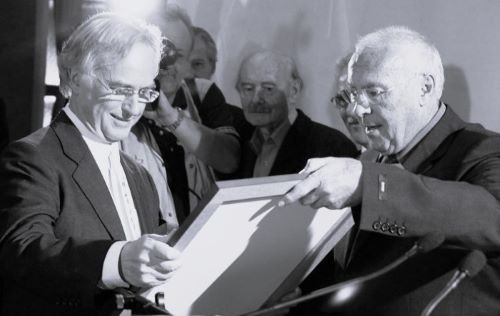
A paradise in the here and now
In all these years Herbert stood out for his restless drive. The moment I had formed an idea, he was already picking up the phone to get things started. Only in retrospect did it become clear to me why Herbert stepped on the gas as much as he did in the early years. He didn't really expect to ever reach his eighth decade of life, due to his pre-existing conditions. In fact, starting in 2010, he found that an old back injury he had sustained decades earlier was affecting him more and more. As a result, walking became increasingly difficult for him. He realized that he would probably not be able to move around on his own for much longer in the expansive building in Mastershausen with its various levels. So, together with his friend, architect Ingmar Weber, he planned a new accessible house in Oberwesel. As was to be expected, the new foundation headquarters near the Loreley was built in record speed, so that the first foundation meeting could take place in "Haus Weitblick" as early as September 2011.
Herbie loved his "Paradiesseits" (a paradise in the here and now), as he called it. He enjoyed receiving guests at "Haus Weitblick," which he transferred to the gbs in 2013, or sitting alone with Bibi on one of the large foundation terraces above the Rhine and watching the passing ships. He also took great delight in noticing the further development of the gbs, especially the diverse activities of the regional groups that had emerged in recent years. In 2014, he already had to use a rollator, but that did not dampen his zest for life - especially since we were able to celebrate not only Herbert's 80th birthday that year, but also the 10th anniversary of the Giordano Bruno Foundation.
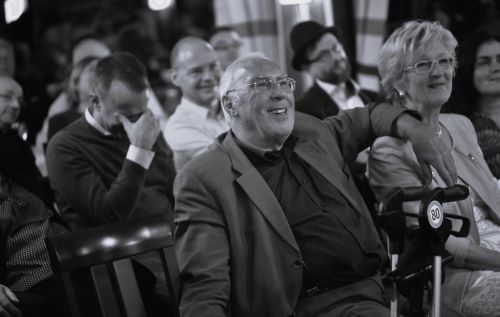
Dwindling strength and late successes
As you can see from the pictures of these two wonderful events, Herbert was still exquisitely vital in 2014, but a year later he suffered a serious health crisis when he was hospitalized with a double pulmonary embolism. He never fully recovered from this blow. Although he still managed to attend the awarding of the Deschner Prize to Raif Badawi and Ensaf Haidar as well as the Frankfurt Future Symposium in 2016, the ceremony marking the 10th anniversary of Ex-Muslims in Cologne in 2017 and the "70 Years of the Basic Law" celebration in Karlsruhe in 2019 were the last gbs events outside the foundation house that Herbert was able to attend.
After the 2015 crisis, he was never quite the same Herbie again. He did try to joke about his own condition ("I have progressed from amentia to bementia to cementia, but fortunately not yet to dementia!"), but you could tell how much he was suffering from no longer being able to be the "doer" he had always been. Until the end, however, he did not miss an opportunity to personally look after the members of the Advisory Board and the Founders' Circle and to call them on their birthdays. Otherwise, he increasingly withdrew from the foundation's day-to-day business. He had already largely handed over the organization of the foundation's finances to Bibi and Elke (Held) and later to Elke and Judith (Liesenfeld) in 2016. He only got involved in the event organization when the events took place in Oberwesel, but here too Elke and Judith ultimately took the lead.
In retrospect, I notice: The more Herbert's strength dwindled, the more I increased the pace myself. Perhaps I unconsciously wanted to ensure that Herbert could still experience the institutional differentiation of his foundation. In any case, after his health crisis in 2015, one spinoff followed the next: in 2016, for example, we supported the founding of the Atheist Refugee Relief, in 2017 we initiated the Institute for Secular Law (ifw), in 2020 we established the Hans Albert Institute (HAI), and in 2021 we were involved in the founding of the Bertha von Suttner-Studienwerk (BvS). It was particularly gratifying for Herbert that the Central Council of Non-Denominationalists went public in 2022. I had already proposed the founding of such a central council in 2004, but this failed at the time due to resistance from other organizations. Herbert, the "doer", who lived by the motto "'Can't be done' doesn't exist!" was pained by this "defeat" for a long time. He was all the more delighted when he was able to witness that the Central Council was finally realized (thanks to the commitment of Rainer Rosenzweig, Philipp Möller, Michael Wladarsch and Ulla Bonnekoh) .
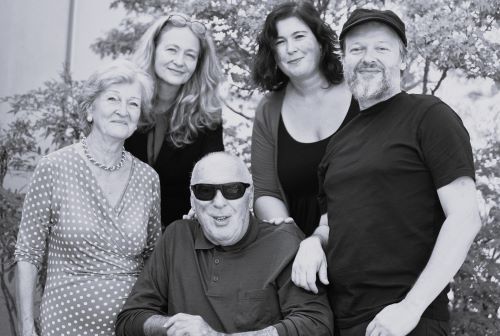
From Saul to Paul: A life report
In the last few years Herbie talked about death more and more often. Usually I tried in such moments to take his mind off it with a joking remark. At the end of 2021, however, I urged him to write down his memoirs, convinced that his autobiography would be significant not only for the foundation he had established, but also for him personally.
I had expected Herbert to be busy with this task for several months. What I had not anticipated was that "old Herbie" suddenly reappeared! In fact, in January 2022, he worked from morning till night on his memoirs. After only four weeks he sent me the manuscript of "My long way from Paul to Saul", which I had not expected until four months later at most. And Herbie's old impatience was back again immediately: The fact that I had to finish the statement "Schwangerschaftsabbruch im liberalen Rechtsstaat" ("Abortion in a liberal constitutional state") on Kristina Hänel's constitutional complaint (§ 219a StGB) first, before I could turn to his memoirs, was acknowledged by Herbie with clear displeasure. Fortunately, together with Elke and Judith, our "house editor" Helmut Fink as well as our "house graphic designer" Roland Dahm, I managed to finish the manuscript in April 2022, so that it was available in printed form just in time for the ifw and gbs advisory board meeting in May.
When I saw with how much joy Herbie signed his book for the ifw and gbs advisory boards, and later also for the young participants of the gbs Summer Forum, I knew that the effort had been worthwhile - also, of course, because his memoirs are well worth reading. They show the existential hardships a man like Herbert had to overcome in order to found a free-thinking organization like the Giordano Bruno Foundation in the last third of his life. In the book, you learn in a very lively way what "medieval circumstances" Herbie came from, how much the time in Catholic boarding school weighed on him, the double standards he was confronted with in the seminary, how difficult it was for him as a "faithful Catholic" to open up to other values, how lost he felt during his studies in cosmopolitan Cologne, how hard he had to work at it, how he had to work hard to turn his father's ailing furniture factory into a prosperous business, how he succeeded in getting back on his feet after the tragic loss of his entrepreneurial life's work, how a reading of the works of Deschner while on vacation roused him from his ideological lethargy, and with what energy he breathed new life into the largely dormant secular scene in Germany beginning in 2004.
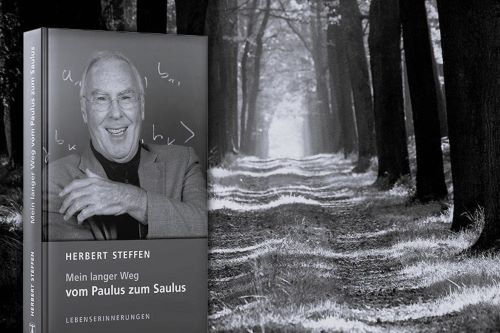
The end of an era
Herbert was an exceptional person, a friend who could always be counted on, a tireless fighter for justice and reason. Beneath his sometimes rough exterior, he had a big, compassionate heart that beat for all those in need - but a heart that will now never beat again. His death leaves a gap that cannot be filled. It is the end of an era – not only for me, the members of the gbs and the various organizations that have emerged from it, but ultimately for all free-thinking people in Germany. However, Herbie, unlike many leaders of medium-sized companies, made sure in good time that business would continue without him. The foundation has been independent of his financial contributions for more than a decade now, because together as a team we have been able to gain many supporters and donors, who help us to bear the foundation's expenses, which increase from year to year. This year, the gbs received an endowment from a third party that almost doubled the foundation's assets, which gave Herbert immense peace of mind.
In recent months, when Herbie handed over his last area of responsibility, looking after foundation members and donors, to gbs member Olaf Zuber, we realized that he did not expect to live much longer. After an event this summer, he slipped me a letter asking to be relieved of his board duties: "I threw a stone in the water, but others are now responsible for the ripples it caused." I proposed a compromise to Herbert, which was the inclusion of a third board member who could replace him if he was no longer able to continue in office.
Four weeks ago, on October 23, 2022, philosopher Ulla Wessels, who had long before been active as an advisory board member and since January 2022 as a trustee of the gbs, was appointed as the third member of the board of the Giordano Bruno Foundation, so that Herbie could be reassured that the foundation's work would continue if he were no longer available. At the time, however, none of us expected this emergency to arrive so soon: it began when Herbert suffered a fractured thigh following a fall two weeks ago. After the operation, complications set in, resulting in multiple organ failure. Last Friday, Nov. 18, 2022, Herbert passed away around 5:30 a.m. in the arms of his wife.
The news of his death came as a heavy blow, but the shock was softened by the knowledge that Herbie did not needlessly suffer. In his autobiography, he had written that he was not afraid of death, but he was afraid of dying. Therefore, despite all the sadness, I am relieved that he hardly experienced anything of the process of dying. Moreover, I am pleased that Herbie was able to experience so much positive recognition during his last months. For this reason, we have also decided to begin the current bruno. annual magazine with an article about Herbert's life. Even before this decision was made, I had a dark premonition that the 2022 issue might be the last bruno. magazine that Herbie would live to see.
Now he is dead - even though he will of course live on in our memories. He will also live on in the many institutions that he helped to create. Herbie had the courage to start something new. He threw the stone into the water, but we alone are now responsible for spreading the wave of enlightenment that he generated. Carpe diem!
